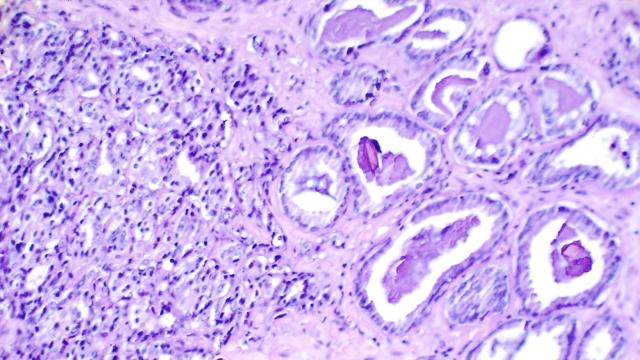As a general rule, cancer patients have to worry about the possibility that their cancer will return with a vengeance, no matter how successful their initial treatment course may have been. But some men with prostate cancer are left in an even more nerve-wracking state of uncertainty. Their cancer appears practically frozen, not spreading elsewhere but also not responding any further to treatment. Sadly, some patients in this state will eventually develop a full-blown, incurable, and ultimately fatal cancer.
A histological slide showing prostate cancer. (Image: National Cancer Institute/Otis Brawley)
But new research, presented this week at the American Society of Clinical Oncology’s annual Genitourinary Cancers Symposium held in San Francisco, seems to offer something meaningful to these patients: More time on the clock.
Two independent teams of researchers tested out their respective drugs on patients whose stalled prostate cancers seemed to be on the verge of erupting and becoming metastatic, based on their rising levels of prostate-specific antigen, an enzyme used to diagnose and track prostate cancer.
The patients were previously given other standard treatments and were still on hormone therapy that depleted their levels of testosterone — a form of chemical castration — since testosterone is known to fuel prostate cancer growth. The trials each randomised its volunteers to either receive the drug or a placebo, and collectively involved around 2600 patients across the globe.
In both trials, those who took the drug survived much longer than those on the placebo. In particular, people given the experimental drug apalutamide lived a median length of 40 months before their cancers became metastatic or they died, which was two years longer than the placebo group. Patients who took enzalutamide similarly lived a median length of 36 months without metastatic cancer, compared to just 14 months for those on placebo.
For both drugs, the researchers estimated they had reduced the risk of patients developing metastatic cancer by around 70 per cent. Those on either drug experienced relatively mild side-effects like fainting, fatigue, and hypertension, but patients overall rated their quality of life as highly as they did prior to starting the treatments.
The findings of the apalutamide trial were also published in the New England Journal of Medicine, while the enzalutamide results have yet to be peer-reviewed.
“It’s controlled my cancer,” 72-year-old Ron Scolamiero, a Massachusetts patient taking apalutamide since 2012, when he was enrolled in an earlier trial, told The New York Times. “I’m so grateful.”
Both drugs block the receptors that allow prostate cells to take in testosterone, essentially boosting the effects of the chemical castration. While apalutamide is in development and intended to be the newest generation of these drugs, enzalutamide is already used to treat prostate cancer that has metastasized.
It’s estimated that three million men in the US currently have prostate cancer, while there are some 160,000 new cases diagnosed annually. Research has shown that anywhere from two to eight per cent of men with prostate cancer worldwide have this particularly hardy form, known as nonmetastatic castration-resistant prostate cancer.
Human trials of these androgen receptor inhibitors have been ongoing for years, but these are the largest seen yet, both being Phase 3 trials that are needed to win final drug approval from agencies like the U.S. Food and Drug Administration (FDA). The makers of apalutamide, Johnson and Johnson, have already applied for FDA approval, while enzalutamide’s makers, Pfizer and Astellas Pharma, are petitioning the FDA to expand its use, according to The Times.
Given the success of these trials, it’s likely that other, possibly older and hopefully cheaper drugs of this class will be tested for these patients in the near-future.
